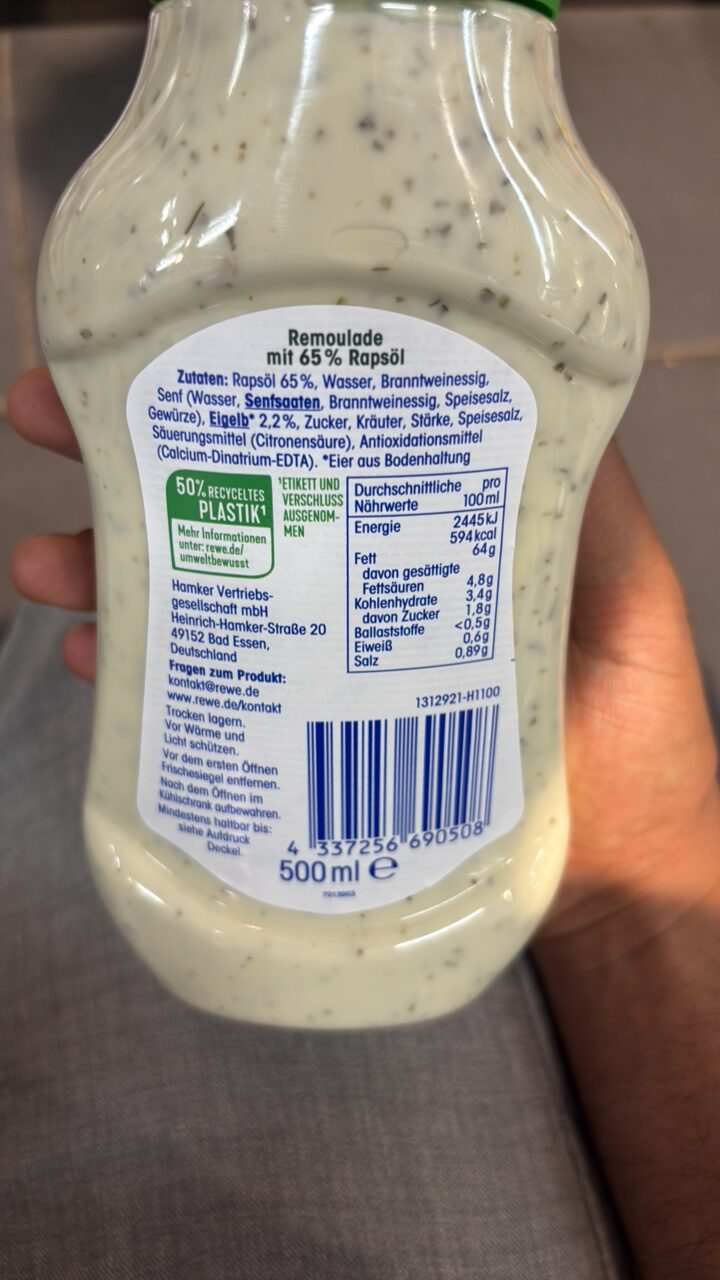
Barcode: 4337256690508
remoulade
HALAL
📝 Reason: The ingredients of this remoulade contain no meat, alcohol, pork derivatives, or ingredients from the Haram_Ecodes_List (E120, E124, E354, E999). All listed ingredients are plant-based or synthetic, and well-established as Halal by global standards (see IFANCA, Halal Guidance, and Halal Stock). Therefore, according to Quran 5:3, the product is Halal.
🏷️ Category: Sauce
📄 Certificates: 50% Recyceltes Plastik, Vegetarisch
Ingredients:
Details
Understanding the Halal Status of Remoulade
Remoulade is a popular sauce used in various cuisines around the world. As consumers become increasingly conscious about Halal products, it’s essential to know the Halal status of items we consume. In this article, we will explore whether Remoulade is Halal or not, breaking down its ingredients and their sources.
Halal Status of Remoulade
The Remoulade we’re discussing here is deemed Halal according to Islamic dietary laws. This status stems from the absence of meat, alcohol, and any derivatives from animals that are considered Haram, as defined by the Quran 5:3. The ingredients list for this sauce includes:
- Rapeseed oil (rapsöl)
- Water (wasser)
- Spirit vinegar (branntweinessig)
- Mustard (senf)
- Table salt (speisesalz)
- Spices (gewürze)
- Egg yolk (eigelb)
- Sugar (zucker)
- Herbs (kräuter)
- Starch (stärke)
- Acidifiers (säuerungsmittel)
- Antioxidants (antioxidationsmittel)
- Calcium disodium EDTA (calcium-dinatrium-edta)
Ingredients Breakdown
Let’s delve deeper into each ingredient:
- Rapsöl (Rapeseed Oil): This is a plant-based oil that is widely recognized as Halal, provided that there is no risk of cross-contamination with Haram ingredients. More information can be found here.
- Wasser (Water): Naturally Halal, as it is a pure substance that does not contain any additives or hazardous materials. Details can be found here.
- Branntweinessig (Spirit Vinegar): Though derived from alcohol, spirit vinegar is transformed into acetic acid, making it acceptable in Halal practices according to most scholars. You can read more about this here.
- Senf (Mustard): This ingredient is entirely plant-based and is classified as Halal. More details are available here.
- Speisesalz (Table Salt): Being a mineral, table salt is inherently Halal, with no restrictions. More information is here.
- Gewürze (Spices): Generally Halal unless they contain Haram ingredients or have been cross-contaminated. A comprehensive list can be found here.
- Eigelb (Egg Yolk): Halal, as long as the yolk does not come into contact with non-Halal substances, explained further here.
- Zucker (Sugar): Plant-derived and Halal according to industry standards. More details can be accessed here.
- Kräuter (Herbs): Like other plant products, herbs are also Halal. More info here.
- Stärke (Starch): Typically derived from corn or potatoes, starch is Halal unless stated otherwise. Learn more here.
- Säuerungsmittel (Acidifiers): Mostly Halal, with no listed E-codes that are Haram. See more here.
- Antioxidationsmittel (Antioxidants): Many commonly used antioxidants are Halal, further details are available here.
- Calcium-Dinatrium-EDTA (Calcium Disodium EDTA): This synthetic food additive is considered Halal. More info here.
Conclusion: Is Remoulade Halal?
In conclusion, all ingredients in this Remoulade sauce are either plant-based or synthetic, conforming to Halal standards as recognized globally by certification bodies such as IFANCA and Halal Stock. With no meat, alcohol, or any other Haram components, this product is suitable for anyone adhering to a Halal diet, ensuring peace of mind while enjoying this delicious sauce. Explore the joy of cooking with Halal-certified ingredients!
